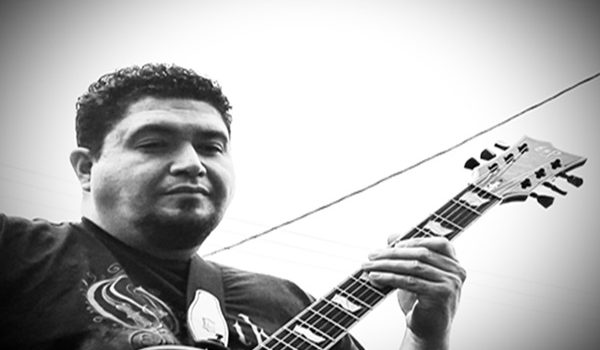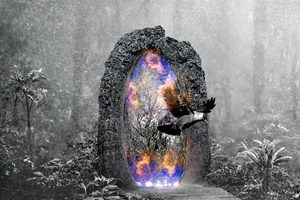Dreams of Gray – Intertwining Sadness and Hope
Tuesday, 14th February 2023
Dreams of Gray sees the return of vocalist/guitarist Luis Rivera to the metal scene following his sabbatical for over a decade after being an integral part of Chicago death metal act Abolisher. His knowledge and ability to convey ideas with a melodic death/thrash base yet incorporate traditional and doom influences as well allows the debut EP The World After a chance to make a strong impact. Intertwining Scandinavian melodic death influences with some potent early Bay Area thrash movements, you know that this will be musically heavy – along with lyrical content that as Luis’ discusses in this talk, may have been therapeutic personally for him.
We reached out to talk about the recording, how technology and home recording made this project come to fruition, memories with Abolisher, favorite memories of Opeth, Morbid Angel, Slayer, and Metallica, concerns about humanity with the pandemic and mental/physical well-being, plus hopes for the future when it comes to Dreams of Gray and Abolisher down the line.
Dead Rhetoric: In the background information regarding the formation of Dreams of Gray, it’s stated that the band formed almost as a sort of accident. What circumstances took place for you to finally develop this new material – and how did you make the decision to enlist the guest musicians on drums and bass for this lineup?
Luis Rivera: Yes, that is true how it came together. Abolisher has been inactive for a long while – I was in medical training for many years, wasn’t able to play music as much as I used to. Two of the other guys started other bands, which are great – Acracy and Legacy Black. Those two bands are pretty active. I had these musical ideas all sitting around, and I wanted to get them out. Some of the material could fit Abolisher potentially, but seeing as I bounced the ideas off the guys – with them being active with the other bands, itching to get them out to the world. The quickest way to do this was to enlist the help of guest musicians. The drummer of Abolisher currently is the one who suggested a couple of people. I got in touch, found some people online, it was surprisingly easy to record this and collaborate with people online. I found people who had recording setups at home, tracking the guitars and vocals here in my house – I sent the material to Scott Elliot at Chernobyl Studios who mixed and mastered it.
Dead Rhetoric: The World After is the debut EP for Dreams of Gray. What can you tell us about the songwriting and recording process for these three songs? Were there any surprises, obstacles, or challenges that came up – and what are your thoughts now that the EP is finally released?
Rivera: The recording process was a learning experience. This is the first time ever I was in the primary songwriting position for the release. This was more of a solo project, so there was a learning curve as far as putting together the rhythms and guitar parts. Previous to this my actual recordings were in a real studio. There were things that were easier recording at home, but then there were definitely some challenges. Getting some feedback on certain parts, you can get in touch with people through the internet but it’s a little different than when you are in the studio recording something and someone can say, you can do this a little better, or this part changed a little. I had to trust what I was doing, although I was open to feedback.
Even though there were challenges, I learned a lot. Overall, I’m very happy with it, proud of the recording and the way that the songs came out. The quality really surpassed my expectations when I started putting this together, tracking the guitars at home. When I first started playing in the mid-90’s, recording technology was a lot different back then. I think mentally I was expecting something along those lines, and I was pleasantly surprised with the quality of the recording.
Dead Rhetoric: What did you want to get across lyrically as far as themes and content?
Rivera: A lot of this was very personal – especially the final two songs in particular. I did suffer some big losses over the past year, my parents and my brother, my entire immediate family. The lyrics and putting this out, music was also a form of therapy for me, getting those ideas out on paper and recording them with music. They have to do with loss, grief, and that’s where gray comes into it. Not necessarily gray as in colorless, but everything looks a little duller with significant loss and trauma in your life. There is beauty there, appreciate things a little more – obviously I wish that my family members were still here. I started to appreciate the impact that they’ve had on my life. I wanted to express the agonizing grief and sadness, but also offer a little glimmer of hope towards the final verses and choruses on the last two songs.
Dead Rhetoric: Was it also your intent to incorporate many different sub-genres, even though it has a melodic death/thrash base?
Rivera: Yes, it was. I listen to a lot of different types of music. I love all types of metal – you could tell this within Abolisher. I really don’t know how to write any other way, that’s the way it comes out. I start writing riffs, and then gather those ideas. The first song is thrashier – I grew up listening to 80’s thrash. I am a big fan of 90’s death metal, melodic death metal, thrash, and doom. Naturally it comes out that way. I wanted to have this thrash/death base, especially with my vocal style – but I wanted to see where each song would take me in terms of the music and the lyrics. That’s what I did, and the songs came out the way they came out. It seemed to naturally fall into place. This is the way I write, but I don’t set out to say this song is going to sound like this.
Dead Rhetoric: How did the cover art piece come about? Did you develop the ideas with the artist on a back and forth basis – or give the person free reign based on the music to come up with this design?
Rivera: I’m very happy with the cover art. I gave (the artist) a general idea of what all the songs were about, the style I was looking for. I gave her examples of cover art I liked, but I didn’t want her to copy. I gave her the demo track for “The World After” and the lyrics. She came up with an idea, I gave her a little feedback, she responded to it well – slight changes in the colors here and there. I loved it.
Dead Rhetoric: Will this remain a studio project or do you see the possibility of maybe assembling a lineup to do some live shows?
Rivera: I would love to do that. The drummer Phil is local, so we will see. He has some other projects. The guys in Abolisher have expressed some willingness to help me out as far as doing some shows, something like that. Depending on their schedules, maybe they will be on the next recording. I would like to see this be not just a project, put together some shows and have a steady lineup. The way things were during the pandemic, it was harder. Now it’s obviously getting a little better. If I’m not able to secure a regular lineup, I will still be putting out music. Hopefully in a year’s time my plan is to be ready to go with another full-length record.
Dead Rhetoric: What are your thoughts on your time with Abolisher during the 1990’s and 2000’s? Any special memories of that time and how the metal scene was during that time in Chicago and beyond – as I understand there is a future album possibly in the works after a decade-long absence from the scene?
Rivera: Yes, I have fond memories of those times. We were really young when we got the band together, we were 17 years old. We had a lot of great shows, we had a decent following in Chicago. We got great reviews in magazines like Snakepit. Those guys in Abolisher, they are like my brothers, they are the ones who know me the longest outside of my parents and brother who are now gone. Great times, and I am looking forward to hopefully putting out another album and playing some shows again.
The metal scene back then, it was exciting to play shows for the first time. We opened up for Angra, we got to play a few metal festivals, not the Milwaukee one. We played with Immolation; those were great experiences. Now, I feel like the scene in Chicago is picking up again. There was a lull for a few years where venues weren’t allowing metal shows, everyone was catering to an indie rock crowd. Now a lot of Chicago venues are open to metal bands playing, I’m optimistic.
Dead Rhetoric: How do you view the heavy metal scene today compared to your youth or twenties? Where do you think you’ve seen the biggest changes (if any), and would you say your passion or love for the genre has gotten stronger over time?
Rivera: Definitely my passion for the genre has gotten stronger. When you are younger, people always think metal is going to be a phase. Now I’m in my forties, and it hasn’t diminished. I would say if anything it’s stronger. Even though I wasn’t actively playing music for a while, I’m a better player and songwriter now than I was then. The metal scene – it’s a little bit different. I had to ask a lot of questions – how do I get my music online? When we released music as Abolisher, there were no streaming services, you printed CD’s and had to send out tapes/CD’s, sold them at the shows, tape traded. I used to love getting printed magazines and fanzines in the mail. This is a little different, now you have streaming, it’s accessible but you aren’t necessarily getting direct sales. There’s a tradeoff, it makes things easier for people to get their music out there, but it is a little different for sales.
I do miss the day of being able to go to a record store and get hard copies of things. People would value having the records, cassettes, CD’s, looking through the artwork and liner notes. It seems like now a lot of people are just as happy having a digital version, without having something tangible.
Dead Rhetoric: Who would you say are three of the most important bands in metal that helped shape your views or outlook on the genre? And what’s the best concert memory you have, purely attending the show as a fan – and what made this show so special to you?
Rivera: Oh man. Three most important bands, that’s really a tough one. For me, this may not come as a surprise, probably Opeth is one of my favorite bands. Morbid Angel is my favorite death metal band. Especially my growling death metal style was heavily influenced by David Vincent. Opeth, his growls remind me also of David, but they are a totally different band. They combine a lot of interesting musical ideas. If I had to pick a third, it would be a toss up between Slayer and Metallica. They are the first really heavy bands I was exposed to as a kid. I was like, woah – what’s that? That’s cool. I remember hearing Master of Puppets and Reign in Blood for the first time, and for the longest time those were my favorite bands and favorite albums.
Favorite concert memory. I think it was when Nevermore toured with Opeth, Opeth’s first big US tour on the Blackwater Park album. They played at the Hard Rock Café in Chicago, and I don’t know if they really do shows there anymore. It was a bar stage; I was standing right against the stage watching Opeth play – and Nevermore was touring for Dead Heart in a Dead World. I love that album; it was an amazing show. God Forbid opened, Angel Dust was second on the bill. At the time I was more of an Opeth fan – and at that show I made myself more of a Nevermore fan. That was my favorite concert memory – I went with my bandmates, we had just finished our Lament the Season EP for Abolisher, seeing such great bands in a close space. I might not have an opportunity like that again.
Dead Rhetoric: What are some of the biggest worries (or concerns) you have regarding the world that we live in today? Where do you think the average person should spend more time, energy, and effort into to make the world a better place for everyone overall?
Rivera: Oh, that’s a good one. Obviously, there are a lot of things that worry me. Being in health care, the pandemic definitely worried me. That’s one of the things I worry about, just seeing our response to public health, how it became so political, I don’t understand that. That worries me, science and public health can be politicized. Wars are going on and that’s troubling. We have the ability to destroy the world many times over with the amount of weapons that are out there, that is very concerning.
It can be very easy to get depressed or really anxious about world events. I would recommend, not that I’m an authority or life coach, is people taking the time to hear each other, give them the benefit of the doubt. Be kinder, show respect and try to look at things that are evidence based. If you are going off one extreme or the other, it’s probably a red flag. In general, try to take care of your community, be involved to the extent that you can be, take care of yourself and your own mental well-being, that’s important. A lot of times we neglect that, and it’s not valued in our society, mental health. It’s a big stigma associated with it, prioritize your own health and well-being. If you are running on empty yourself, there’s not really much you can do to help someone else.
Dead Rhetoric: What’s on the horizon for any activities that you will be involved with musically, either with Dreams of Gray, Abolisher, or other side things, that we can expect in the next twelve months or so?
Rivera: No other side projects – either Dreams of Gray or Abolisher. We practice somewhat regularly as Abolisher, we hope to get into the studio within a year or so, and put something out plus play some shows. Roughly the same timeline to release a Dreams of Gray full-length. I may stagger the releases a little bit. Those are the things I’m most involved with. I’m itching to get back out there and play live shows.
























